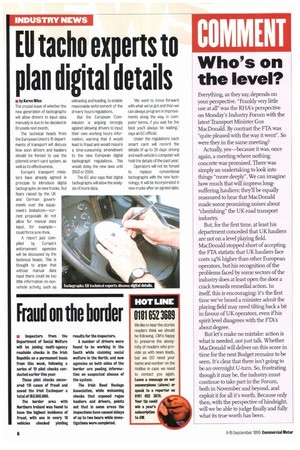EU tacho experts to plan digital details
Page 8

If you've noticed an error in this article please click here to report it so we can fix it.
• by Karen Miles The crucial issue of whether the new generation of tachographs will allow drivers to input data manually is due to be decided in Brussels next month.
The technical heads from the European Union's 15 departments of transport will discuss how soon drivers and hauliers should be forced to use the planned smart-card system, as well as its effectiveness.
Europe's transport ministers have already agreed in principle to introduce digital tachographs on new trucks. But fears raised by the UK and German governments over the equipment's limitations—current proposals do not allow for manual data input, for example— could force a re-think.
A report just com piled by Europe's enforcement agencies will be discussed by the technical heads. This is thought to argue that without manual data input there could be too little information on nonvehicle activity, such as
unloading and loading, to enable reasonable enforcement of the drivers hours regulations.
But the European Commission is arguing strongly against allowing drivers to input their own working hours information, warning that it would lead to fraud and would require a time-consuming amendment to the new European digital tachograph regulations. This would delay the new laws until 2003 or 2004.
The EC also says that digital tachographs will allow the analysis of more data. 'We want to move forward with what we've got and then we can always program in improvements along the way. In computer terms, if you wait for the best you'll always be waiting,' says an EC official.
Under the regulations each smart card will record the details of up to 28 days driving and each vehicle's computer will hold the details of the past year.
Operators will not be forced to replace conventional tachographs with the new technology; it will be incorporated in new trucks after an agreed date.












































































































